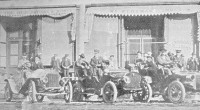

OTHER PROCEEDINGS
Items of interest through the various periods of our town's history should also be noted. The town bought coal for $3.00 a ton in 1896 and the drayman unloading the car of coal was paid $3.00 for the entire job. Draymen were paid only 25 cents per load for hauling anything. Day labor was $1 per day and $2.50 if he also had a wagon and team of horses. This pay scale lasted for years.
Our first oil station was built by the Standard Oil Company, with permission by the Council, May 6, 1910. In October of 1905 all slot machines were to be removed from the town.
In April, 1910, a new state law designated that the number of councilmen be reduced from six to five members. John Hoffmann, who had been serving as a councilman for 14 years, obliged the Council by resigning so the newest member would not be forced to leave. Upon his resignation the Council extended him a vote of thanks for his long, able and efficient service to the people of Manning and presented him the chair he had honorably occupied in the chamber. However, in 1916, he was re-elected; he served two terms, and his total of 18 years is the longest anyone has ever served.
In May, 1924, our Council negotiated with the U.S. Postal Department to have all mail delivered. By January 16, 1925, all owners of the real estate in Manning were to number their buildings and residences in accordance to a plan instituted by the city clerk's office.
In later years, but previous to 1955, the Council met in the second floor room above the old fire station next to the hospital, which is now the location of the south wing of the Manning Plaza. Cramped quarters included the clerk's office and the public library. In March, 1955, the town bought the burned-out Ohrt building and lots for $2500 and erected the present-day public offices. Herbert Hass, Manning Heating & Sheet Metal, and Franck Bros., of Audubon did the construction at a total cost of $43,305.69. The building was ready for occupancy October 1, 1956.
In March of 1977 the Council approved the establishment of an Urban Renewal Agency and in July, 1979 helped the Community Services Corporation with a grant of $6,000 toward the purchase of a bus for senior citizens' use. The Council also assists with the congregate meals program by paying $50 a month toward the bus expenses and also $50 per month to the V.F.W. for utilities.
The average number of Council meetings per year run from 30 to as high as 42. In the beginning the councilmen were paid $1 a meeting and the mayor's salary was $60 a year. This continued until April, 1921, when councilmen received $2 per meeting. The mayor's salary was increased to $400 in 1932. However, due to the Depression in 1933, the salaries were lowered back to $1. Increases came again in 1942 and with the exception of another reduction in 1948, payments have coincided with the trend of the economy and the salaries as of January, 1980, are $15 per meeting but not to exceed $400 per year for the councilmen, and the Mayor's was set at $200 per month.
The salary of the Board of Health officer was $25 per year from the very first and is the same amount today. Dr. John Hornberger, the present officer, has offered his services for the past 29 years at this nominal rate.
Harry Rix was elected Treasurer in April, 1936, and continued in that office for almost 40 years until his resignation in December, 1975. He has served the longest term of anyone in our government.
Since 1960 various commissions have been created to cope with our modern way of life for the betterment of our community. November 7, 1960, a City Planning and Zoning Commission was created to act upon and enforce decisions set forth by the Council regarding future construction and rebuilding projects in Manning. Present members are Emil Ruhde, chairman; Glen Steinke, Charles Fielweber, Merlin Schroeder, Lyle Rowedder, and Gary Smith.
August 28, 1967, a Low-Rent Housing Agency was formed with the present board members: William G. Ohde, chairman; Daryl Genzen, Walter Felker, Charles Hughes and Arthur Rix.
The Board of Adjustments was formed October 6, 1969, to serve as housing advisory and appeals board and to act when variances occur. The present board members are Duane Monson, chairman; Dr. Martin Ahrens, Lee Foote, Gaylin Ranniger, and Willis Puck.
August 3, 1970, the Urban Renewal Agency was formed with the following present members: Tom Williams, chairman; Orval Fink, Ron Colling, Elmer Mueller, and Charles Rauch.
The Manning Recreation Center Committee was created in February of 1979 for a community project. Members are Darrell Vondrak, representing the Council; Kenneth Stripling, school representative; Kenneth Puck, Park Board representative; eight members-at-large, and eight students.
Hansen, Bunz and Mugan have served as our city attorneys since Erwin Hansen started in 1948.
Lack of space would, not allow naming all the people who served on our Council and town offices, but we want to express our gratitude to all those special persons who served these past 100 years, for they helped create our fine town of Manning, Iowa. Our "town", incidentally, suddenly grew into a "city" several years ago, due to a state law which reclassified all Iowa communities as cities.